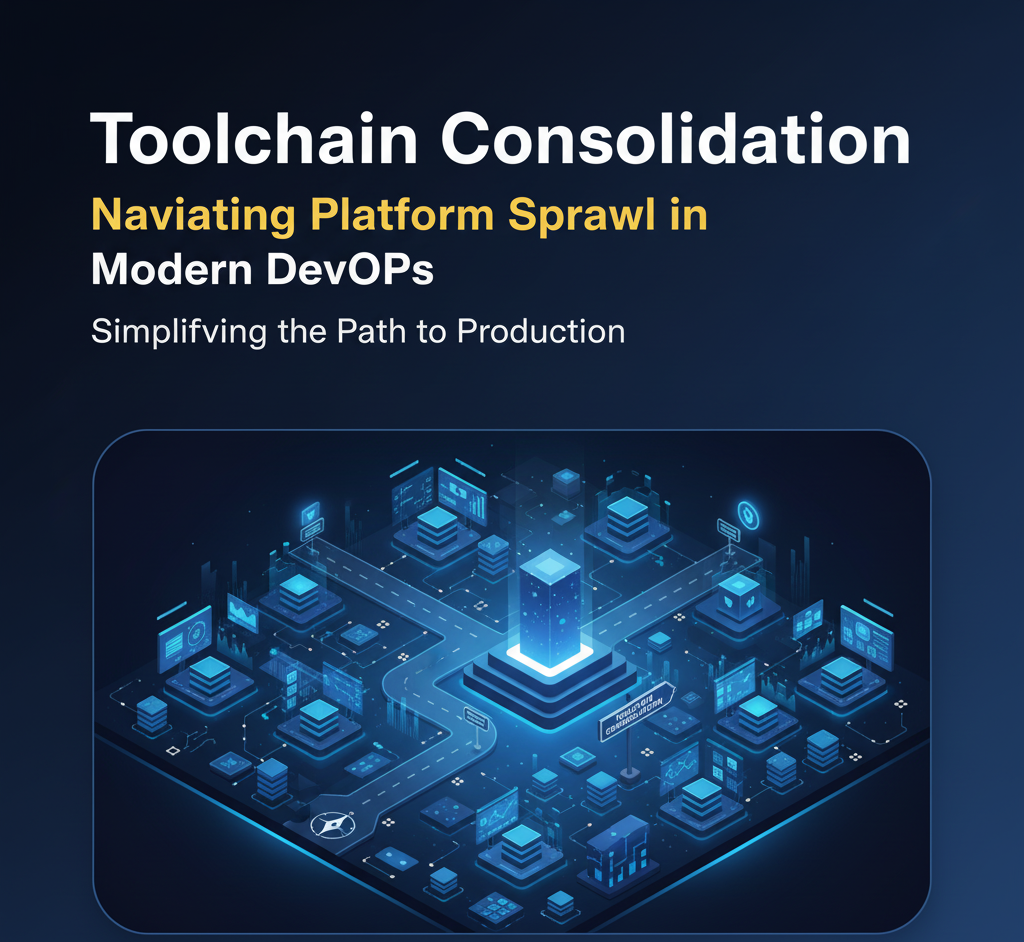Toolchain Consolidation: Navigating Platform Sprawl in Modern DevOps

Introduction
Modern DevOps is supposed to accelerate development, streamline deployments, and make operations smoother — but in reality, many teams are facing a hidden enemy: platform sprawl.
Over the years, organizations have accumulated dozens of tools across CI/CD, monitoring, security, collaboration, testing, and more. What starts as a best-of-breed approach ends in chaos — disconnected tools, duplicate effort, and frustrated engineers. That’s where Toolchain Consolidation comes in.
As DevOps engineers, simplifying our ecosystem is not just a nice-to-have — it's a strategic necessity.
What is Platform Sprawl?
Platform sprawl refers to the uncontrolled growth of tools and platforms across the SDLC. While each tool may serve a unique purpose, the lack of integration creates silos, slows teams down, and increases operational overhead.
Symptoms of Sprawl:
- Too many dashboards, too little insight
- Manual handoffs between tools
- Complex onboarding for new team members
- Inconsistent security policies
- Hidden costs from unused or overlapping tools
What is Toolchain Consolidation?
Toolchain Consolidation is the practice of reducing the number of tools in your DevOps pipeline by:
- Choosing multi-functional platforms
- Integrating tools more tightly
- Eliminating redundancy
- Aligning teams on common workflows
Instead of juggling 15+ tools, imagine working with a few robust, well-integrated platforms. That’s the goal.
Benefits of Consolidation
- Improved Developer Experience – Fewer tools = less context switching
- Increased Speed – Streamlined workflows and automation
- End-to-End Visibility – One place to monitor delivery pipelines
- Better Collaboration – Teams work from a unified platform
- Lower Costs – Reduce licensing, maintenance, and training expenses
- Stronger Security – Easier compliance and policy enforcement
Example: A company replaces 5 different CI/CD tools (Jenkins, CircleCI, GitHub Actions, Spinnaker, and Argo) with GitLab or Azure DevOps — reducing complexity, cost, and cognitive load.
Consolidation Strategy: Step-by-Step
1. Audit Your Stack — List every tool in your SDLC – from planning to monitoring.
2. Identify Redundancies — Where are you using 2–3 tools for the same job?
3. Define Core Use Cases — What do your teams really need (CI/CD, IaC, monitoring, etc.)?
4. Choose Flexible Platforms — Prefer platforms that support multiple functions (e.g., GitLab, Harness, Atlassian, Azure DevOps).
5. Involve Teams Early — Developers, QA, SecOps, and SREs should all contribute to tool decisions.
6. Pilot, Measure, Scale — Start small, validate results, and expand gradually.
Real-World Use Cases
- Startup Scaling Up – Consolidates GitHub + Jenkins + Jira into GitLab to simplify workflows.
- Enterprise Migration – Moves from 10+ DevOps tools to Azure DevOps + Terraform for integrated infra and pipelines.
- Hybrid Cloud Teams – Use a unified dashboard for AWS, Azure, and GCP with centralized observability.
- SRE-Driven Consolidation – Reduces alert fatigue by integrating monitoring and incident response tools.
Security & Governance
Tool consolidation also simplifies security and compliance:
- Central Access Control – Manage permissions in one place
- Audit Logs – Track changes across infrastructure and apps
- Policy as Code – Enforce guardrails across the pipeline
- Secret Management – Integrated tools reduce misconfigurations
The Future is Integrated
The future of DevOps isn’t about collecting more tools — it’s about connecting the right ones. Toolchain consolidation helps teams:
- Move faster
- See more clearly
- Stay secure
- Deliver better experiences
Final Thoughts
Toolchain consolidation isn’t just a cleanup effort — it’s a strategic move toward sustainable DevOps. By reducing complexity, aligning workflows, and integrating your ecosystem, you're building a DevOps foundation that can truly scale.
In the race for speed, agility, and resilience, simplification wins.